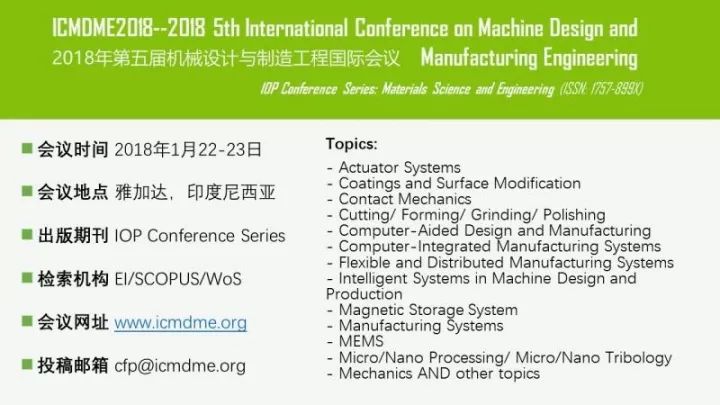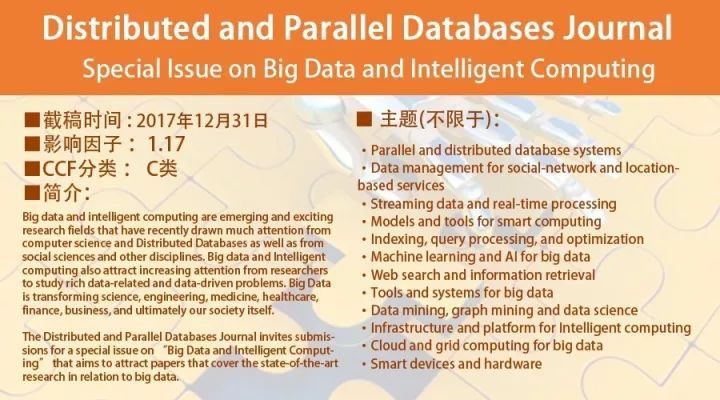计算机类 | 高引SCI期刊FGCS专刊信息6条
计算机体系结构,并行与分布式计算
Future Generation Computer Systems
Big Data and Internet of Things – Fusion for different services and its impacts
全文截稿: 2017-10-30
影响因子: 3.997
CCF分类: C类
中科院JCR分区:
• 大类 : 工程技术 - 2区
• 小类 : 计算机:理论方法 - 2区
网址: http://www.journals.elsevier.com/future-generation-computer-systems/
Big Data and Internet of Things (IoT) have produced profound impacts to our everyday life and are hands in hands to offer better quality of services, better fusion of technologies, instant communications and express deliveries of services. The fusion between Big Data and IoT can produce positive impacts in the next-generation of our development in smart cities, national planning and forecasting of our future activities and investments. Big Data and IoT fusion can be pervasive to our daily life in healthcare, finance, security, transportation and education. To enable next generation of different services, we need to understand and realize the significance of fusion between hardware and software, and between security and reality. By doing so, we can get very light and portable devices that can contain petabytes of data, which need layers of security functions and services to make them protected. We can also use one device that can be a mobile phone, instant messenger, video conferencing center, GPS, database, investment analytics, weather forecaster, camera and data processing center. We can also provide real time security services that can destroy a vast variety of Trojans and viruses, block all security breaches, restore things back to normal and keep the owners alert and safe in real time. Big Data and IoT fusion can help high-tech sectors such as weather forecasting, space technology and biotechnology to enable thousands of simulations to be completed in seconds. All these high tech features have become reality and not just in movies enabled by the impacts of Big Data and IoT fusion. In this call, we seek high quality papers that can demonstrate proofs-of-concept, services, solutions for research challenges, case studies, analytics, real world examples and successful deliveries of Big Data and IoT fusion. Top papers from the international conference on Big Data Analytics and Business Intelligence http://www.xjtlu.edu.cn/en/events/2017/06/international-conference-on-big-data-analytics-and-business-intelligence at Xi’an Jiaotong Liverpool University in China will also be invited and authors must add new contributions of another 60% and above.
Topics
Submissions could consist of theoretical and applied research in topics including, but not limited to:
- Big Data and IoT fusion for health informatics and medical services
- Big Data and IoT fusion for business intelligence and finance
- Big Data and IoT fusion for modern education
- Big Data and IoT fusion for energy applications and services
- Big Data and IoT fusion for natural science, weather forecasting and earth science
- Big Data and IoT fusion for smart cities
- Big Data and IoT fusion for security, privacy and trust
- Big Data and IoT fusion for 5G networks and communications
- Big Data and IoT fusion for mobile services and computing
- Big Data and IoT fusion for the next generation architecture
- Big Data and IoT fusion for any forms of predictive modeling and analytics
- Big Data and IoT fusion for real world examples and case studies
- Network fusion, multimodal and multinodal fusion.
- Service, network and data fusion in modern architecture
- Service, network and data fusion in health informatics, financial services and education
- Service, network and data fusion in weather studies, social networks, wireless and 5G network
- Service, network and data fusion in security, privacy, energy and mobile apps
- Service, network and data fusion in IoT, big data and complex information systems
- Fusion for fog and edge computing
- Industry 4.0 fusion
计算机体系结构,并行与分布式计算
Future Generation Computer Systems
Special Issue on Intelligent Security and Optimization in Edge/Fog Computing
全文截稿: 2017-12-15
影响因子: 3.997
CCF分类: C类
中科院JCR分区:
• 大类 : 工程技术 - 2区
• 小类 : 计算机:理论方法 - 2区
网址: http://www.journals.elsevier.com/future-generation-computer-systems/
Edge/fog computing is considered a potential characteristic novel technique that powers up the implementation of cloud computing in industry 4.0. The edge server layer is expected to be a medium that intelligently optimize the use of the computing resources. This technology innovation has begun to drive new levels of performance and productivity in multiple domains. Meanwhile, cloud computing also is becoming a major enabler of various industrial innovations. Within the transformations, edge/fog computing is a quick powered component that combines cloud computing with other network-based techniques, such as Internet-of-Things (IoT) and web services. Even though edge/fog computing has a great potential to speed up the next generation of the networking implementations, security and privacy concerns still are restricting its applications. The threats exist at different layers due to more parties are involved in the service processes. Both detecting threats and finding out solutions are significant. Building up an intelligent security mechanism in edge/fog computing is an urgent mission in an advanced network setting.
This special issue aims to gather recent research work in security and privacy topics and discuss, evaluate, and improve the novel approaches of data protections in edge/fog computing. Our primary focus will address novel security mechanisms in edge/fog computing, advanced secure deployments for large scaled edge/fog computing, intelligent secure solutions, and new efficient data encryption strategy of edge/fog computing.
Scope:
Topics of particular interest include, but are not limited to:
- Trust in social networks in edge/fog computing in edge/fog computing
- Security policy, model and architecture in edge/fog computing
- Security in social networks in edge/fog computing
- Security in parallel and distributed systems in edge/fog computing
- Security in mobile and wireless communications in edge/fog computing
- Security in cloud/pervasive computing in edge/fog computing
- Privacy in parallel and distributed systems in edge/fog computing
- Privacy in cloud/pervasive computing in edge/fog computing
- Privacy in mobile and wireless communications in edge/fog computing
- Privacy in e-commerce and e-government in edge/fog computing
- Privacy in network deployment and management in edge/fog computing
- Computational forensics in edge/fog computing
- Cyber-physical system forensics in edge/fog computing
- Data mining for forensics in edge/fog computing
计算机体系结构,并行与分布式计算
Future Generation Computer Systems
Special Issue on Autonomous Cloud
全文截稿: 2017-12-31
影响因子: 3.997
CCF分类: C类
中科院JCR分区:
• 大类 : 工程技术 - 2区
• 小类 : 计算机:理论方法 - 2区
网址: http://www.journals.elsevier.com/future-generation-computer-systems/
Autonomous Cloud is an exciting area of development and research that utilizes artificial intelligence, machine learning and data analytics to aid in intelligent cloud management and decision making. Such techniques can support automation of operations such as services mapping, scaling, network design, data organization and security management. However the drawback with machine learning is that the learning period can be long. Furthermore the priority of particular performance indicators can vary with changing stakeholder requirements adding more complexity and learning time. . To what extent can the Cloud be self-organising? This special issue brings together high-standard research and review papers that reveal the edge of the art in this important, challenging area.
Areas of interest include but are not limited to:
- New models for the distributed cloud infrastructure
- Autonomous and distributed cloud management systems
- Novel methods for predictive load modelling possibly using application semantics and considering time zones and location
- Distributed analytics – considering data and usage patterns across the network and federated Cloud
- Load balancing, data balancing and task scheduling in dynamic environments
- Services and application mapping considering both Cloud and Cloud edge locations
- Intelligent Cloud responses to application and usage behaviours
- Application agents that determine best placement for applications
- Machine learning for autonomous Cloud
- Vertical and horizontal tuning for application areas and application examples
- Dynamic network design to meet changing requirements and loading
- Cloud security and dynamic security management
计算机体系结构,并行与分布式计算
Future Generation Computer Systems
Special Issue on “Novel edge computing-inspired approaches and paradigms for mobile IoT applications”
全文截稿: 2018-02-01
影响因子: 3.997
CCF分类: C类
中科院JCR分区:
• 大类 : 工程技术 - 2区
• 小类 : 计算机:理论方法 - 2区
网址: http://www.journals.elsevier.com/future-generation-computer-systems/
Mobile-oriented cloud architectures and technologies play an important and increasing role in practice due to the widespread adoption of mobile devices. From the industry perspective, the synergy between mobile and cloud technologies has resulted in new cloud provisioning models for supporting mobile application development and deployment, such as Mobile Backend as a Service (MBaaS). MBaaS supports cloud services which are commonly needed by web and mobile systems (e.g., data storage, identity and access management, synchronization and push notifications). From an academic perspective, mobile cloud computing (MCC) is a way of augmenting mobile devices and dealing with the inherent limitations related to remote resources located in the cloud. Specifically, MCC combines advances from mobile computing, cloud computing and wireless/fixed networks so that rich applications, such as speech recognition and augmented reality, can be seamlessly and efficiently “executed” on mobile devices via the actual execution of computations and data processing on remote cloud resources. Techniques materializing this idea include offloading and cyber-foraging.
Fog computing paradigm was introduced around 2012 to provide highly-scalable infrastructures for latency and location-aware MCC applications, where geographical distribution, mobility and SW/HW heterogeneity prevail. While fog computing can be viewed as a special case of MCC, it represents also an evolution of the latter since it includes the ability of augmenting mobile (e.g., laptops, smartphones, tablets and wearables) and wireless devices (e.g., sensors and actuators) with processing/storage resources in their proximity, in terms of network topology. Indeed, several flavors of this idea, including micro-data centers, cloudlets and fog computing itself, follow the edge computing model, by which data/computations are processed using computing resources located at the edge of the network –accessible through wireless protocols– and optionally using remote resources in the cloud.
Motivated not only by the increasing number of mobile devices, but also their ever-growing computing and sensing capabilities, there have been efforts to leverage these devices as destination for offloading computations/data in the context of edge/fog applications. Such a trend has also been referred to as dew computing in the literature. However, current research in the area is still focused on augmenting mobile clients via fixed computing resources (e.g., local servers and computer clusters), so huge unexploited computing and sensing capabilities remain “at the edge”. Therefore, many research opportunities to exploit mobile devices in the context of edge/fog computing arise.
Topics
This special issue aims at collecting novel ideas to materialize this new evolutionary step of Edge Computing, i.e. those moving the edge even closer to the application/data source and conceiving mobile devices as having a dual role by which they both exploit nearby and remote fixed resources, and also offer their own resources (e.g., CPU cycles, storage and even sensors) to nearby/external applications and services. Potential topics include, but are not limited to, the ones shown below:
- Architectures, frameworks, standards and platforms for dew/fog/edge computing
- Programming models, APIs and toolkits for dew/fog/edge computing and IoT
- Offloading techniques for compute-intensive and data-intensive IoT applications
- Middleware for distributed computations and data management in edge computing
- Resource scheduling and management in edge computing
- Energy efficiency and energy consumption aspects (middleware-level and application-level)
- Fault-tolerance and scalability mechanisms
- Service-orientation and QoS concepts applied to edge computing
- Context-awareness for IoT applications at the edge
- Technical solutions to address security and privacy in edge computing environments
- Novel applications and experiences with edge computing
计算机体系结构,并行与分布式计算
Future Generation Computer Systems
Special Issue on Smart Data in Future Internet Technologies and Cloud Computing
全文截稿: 2018-05-15
影响因子: 3.997
CCF分类: C类
中科院JCR分区:
• 大类 : 工程技术 - 2区
• 小类 : 计算机:理论方法 - 2区
网址: http://www.journals.elsevier.com/future-generation-computer-systems/
The fast growing data volume has enabled multiple application to become “smart” in implementations. The Internet technologies combining distributed computing settings such as cloud computing have further increased the performance of the system. The benefits of using data-driven applications have a strong impact on various industries, including the financial industry, manufacturing, consulting agency, and healthcare. One of the vital issues in data-driven applications is to find out efficient methods of optimizations in both executions and outputs sides. The challenges are varied, which could include but are limited to speeding up the data mining efficiency in big data, secure data transmissions among multiple stakeholders, adoptable network designs for multi-channel communications, etc. Using data wisely is considered one of the potential solutions to the potential risks or restrictions in the field.
This special issue aims to gather recent quality work in the topic of smart data in future Internet technologies as well as cloud computing and provide the work with a discussion and evaluation forum. The principal focus of this special issue will address new techniques in the field of data mining in the network and cloud context.
Scope:
Topics of particular interest include, but are not limited to:
- Cloud workload profiling and centralized control solution
- Self-service cloudlet and clustered edge servers
- Analytics applications
- Scientific computing and data management
- Cloud metering, implementation, and monitoring
- Network-based big data management and analytics
- Smart storage and data analytics in clouds
- Cyber threat intelligence and defense
- Data-driven service management automation
- Security and fault tolerance for embedded or ubiquitous systems
- Cloud security and privacy issues
- Sensor network security issues in mobile cloud computing
- Embedded networks and sensor network optimizations
- Cloud computing and networking models
- Ambient intelligence and intelligent service systems in cloud system
计算机体系结构,并行与分布式计算
Future Generation Computer Systems
Technological innovations in Digital transformation
全文截稿: 2018-05-31
影响因子: 3.997
CCF分类: C类
中科院JCR分区:
• 大类 : 工程技术 - 2区
• 小类 : 计算机:理论方法 - 2区
网址: http://www.journals.elsevier.com/future-generation-computer-systems/
It is widely acknowledged that organizations have suffered a large evolution at the social, economic and technological levels where the traditional barriers of transferring information and knowledge have been progressively eliminated. This evolution allowed the elimination of silos, the breaking down of hierarchies, the connection of internal and external stakeholders and the empowering of employees. In this context, the integration of technological innovations, such as Big Data – Analytics, Cloud Computing, Mobile Connectivity, and Social, the four pillars of digital transformation, in business practice can enable significant competitive advantage.
According to Earley Information Science digital transformation (DT), is today a top priority for executives, being that (1) 125000 enterprises expect revenue from their digital initiatives to increase by 80% by 2020; (2) DT initiatives will more than double by 2020, from 22% to almost 50% and, (3) only 27% of businesses have a coherent digital strategy for creating customer value in place.
The main purpose of digital transformation is to obtain benefits of digital technologies, such as productivity improvements, cost reductions and innovation. Nevertheless, for these results to be achieved, a total organizational commitment is required.
From the organizations’ point of view, DT can be seen as a deep and accelerating transformation with regard to processes, activities, competencies and models, in order to take advantage of the changes and opportunities offered by the inclusion of digital technologies into an organization. However, this advantage is only possible if the information systems of the organizations are aligned with these new technologies.
Thus, the Future Generation Computer Systems journal is seeking manuscripts for a special issue entitled “Big Data, Cloud, Mobile and Social in Digital transformation”. This issue will have as broad a scope as possible with respect how DT can be used to attain this goal. We also would like to attract papers that discuss the impact of the DT in the everyday life citizens, enterprises and governments.
This special issue will include full-papers resulting from:
- Extended papers presented at the WorldCist'18 - 6th World Conference on Information Systems and Technologies (http://www.worldcist.org) to be held at Naples, Italy, 27 - 29 March 2018. For this special issue will be selected some best papers from the tracks “A) Information and Knowledge Management (IKM)”; “D) Software Systems, Architectures, Applications and Tools (SSAAT)”; “H) Big Data Analytics and Applications (BDAA)”.
- Other original research contributions focusing on the aims and scope of this special issue.
登录查看更多
相关内容
FGCS:Future Generation Computer Systems。
Explanation:未来一代计算机系统。
Publisher:Elsevier。
SIT:http://dblp.uni-trier.de/db/journals/fgcs/
Arxiv
3+阅读 · 2020年4月13日






